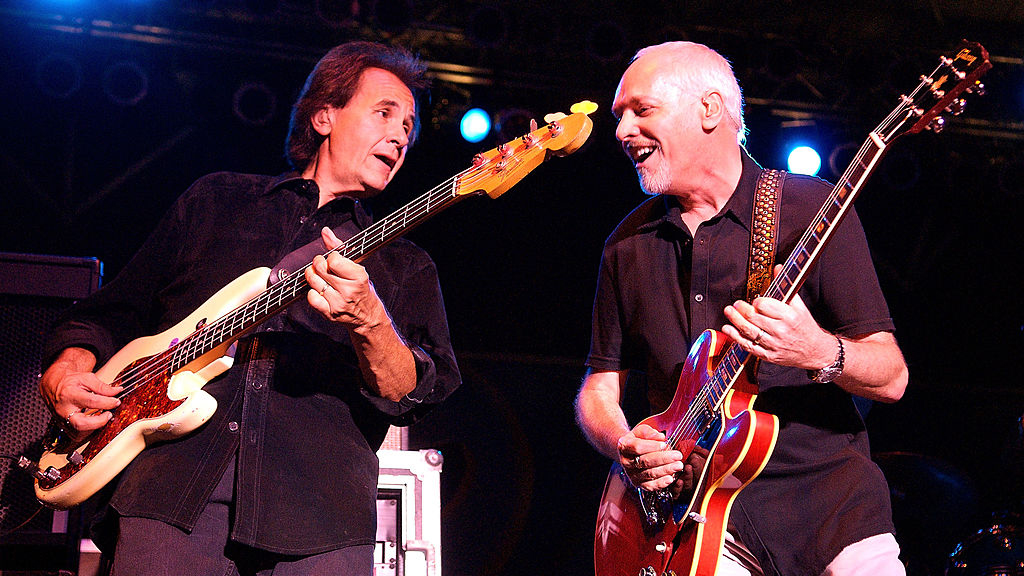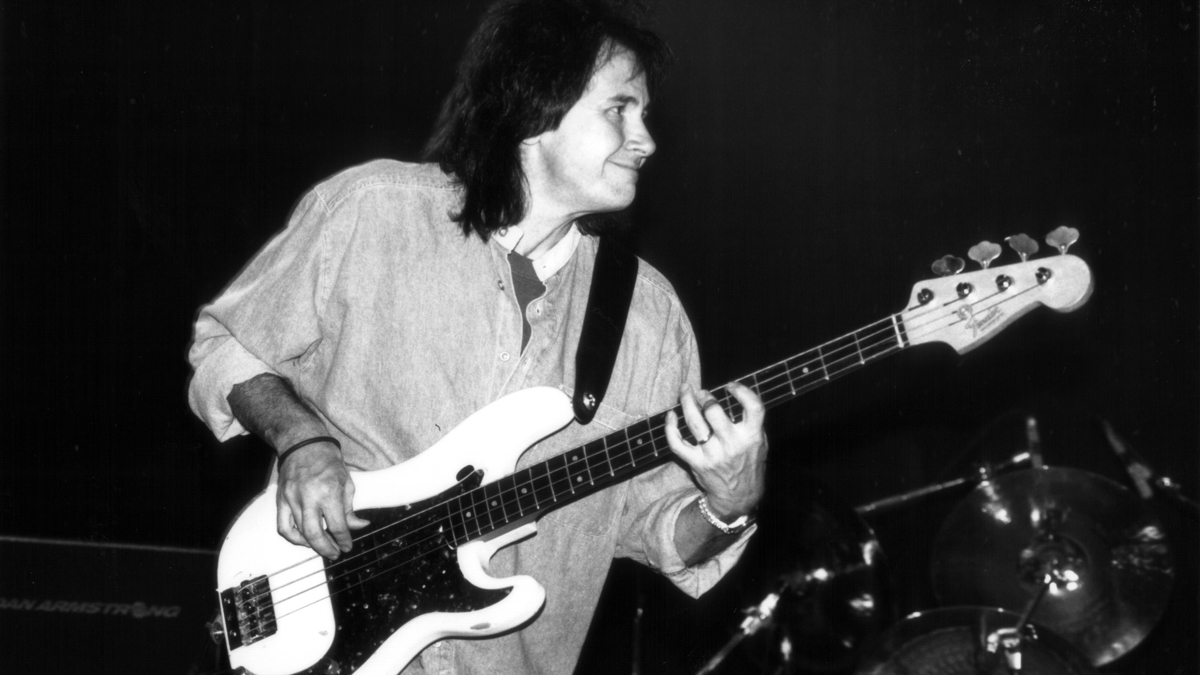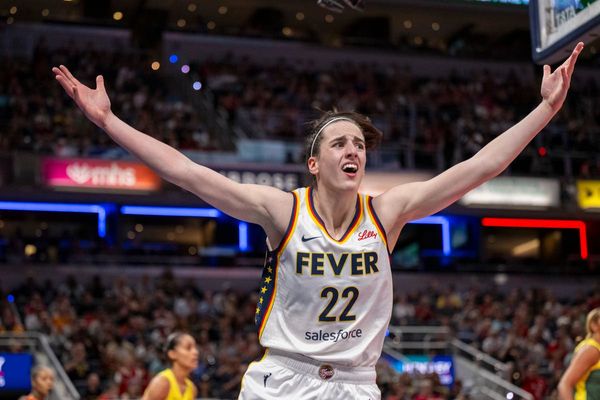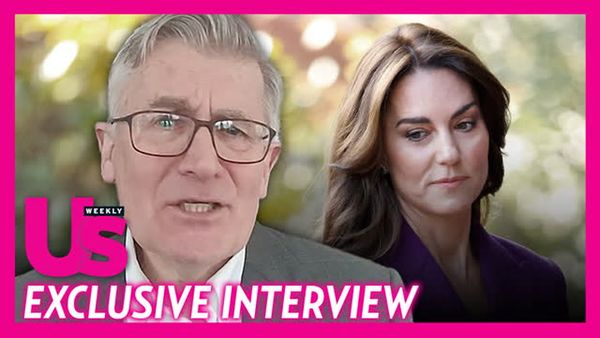
Throughout rock and metal history, there have been many overlooked players. Especially bassists. And given his untimely passing this year, on April 7, 2023, one that immediately comes to mind is John Regan.
Of course, when I dialed in with Regan on Tuesday, April 4, 2023, I had no way of knowing that it would be for the last time. As far as I knew, despite being 71 years of age, John was in good health. And during our call, it was clear that his spirits were even better.
“It's good to talk with you,” Regan said. “I'm always happy to look back. It's been an incredible run, and I'm thankful for all of it. If you had told me back when I was a kid that I'd play with Peter Frampton and Ace Frehley, I never would have believed it. My career has been a dream come true. I hope people know that despite whatever challenges have come my way over the years, I'm thankful for all of it.”
Looking back on it all, it's not hard to see why Regan harbored so much pride. It's not every day that a relative unknown gets to hop on tour and record with the likes of Peter Frampton and Ace Frehley. But then again, given his talent and relentless drive to succeed, perhaps Regan's career was pre-destined for greatness, albeit on a low-key level.
“My career has been a mix of hard work combined with expecting the unexpected," Regan laughs. "Sometimes, I'd look around and think, 'How the hell did I get here?' But then, I'd remember the hundreds of sleepless nights and thousands upon thousands of hours spent practicing.
“But I know that there's a ton of people who can do what I do,” Regan admits. “But I'm not sure there's the same amount of people who worked as hard as I did. I made the most of what was given to me. I knew that if I didn't make my own breaks and take each and every opportunity handed to me, I'd never make it.”
Just days before his untimely passing, bassist John Regan dialed in with Guitar World to dig into his earliest musical hours, touring with Peter Frampton and the origins of his friendship with Ace Frehley.
What did your musical origins look like?
“Being Sicilian, there was music playing in my house constantly. I was very close with my grandmother, who lived upstairs. I'd go up and visit her often, and she'd play me stuff by Frank Sinatra and all those guys. And then my mother always had the radio on it, so that would have been a lot of what you can imagine was popular in the '50s and '60s.
“Those things set the tone for me to be a lifelong lover of music. But like many kids my age, and you've probably heard this before, The Beatles' performance on The Ed Sullivan Show was the turning point. That instantly opened a whole new musical world for my entire generation. Without that event, I can't imagine putting bands together and being able to become a musician.”
How did you progress from local bands to being a professional musician?
“I worked my way up through various garage bands. Back then, kids didn't have social media and all that. So, you basically either played sports or were in a garage band. I guess you could say I chose the life of rock 'n' roll from a young age [laughs]. And by the time I was in high school, I'd been in a bunch of bands that were all aimed at getting girls and all that. I never really had a plan or an idea in mind where I was plotting my next move. Things just sort of happened from one thing to the next, and I just held on and stayed along for the ride.”
Was that essentially working the club scene and trying to be seen?
“Yeah, that's pretty much it. I started playing clubs, and before long, I was earning a living doing this thing that I found interesting. This was after high school, mind you. Anyway, by the mid-'70s, I was in a group called Easy Street, and while we never made it big, that was a huge education for me. I stayed with Easy Street all the way until getting my break with [Peter] Frampton in 1979. But I'll never forget the feeling of playing with the guys in Easy Street. It was the feeling of a band firing on all cylinders. No amount of money can buy that feeling. I wish we'd made it.”
How did you land the gig with Peter Frampton?
“Like I was saying, I was with Easy Street. We were playing clubs and gigging around the Hudson Valley in Upstate New York and did well. We were to the point where we were kind of patting ourselves on the back because we'd become one of the bigger local bands in that area. Sort of how Talas formed a cult following up there in the early '80s; it was the same thing with Easy Street.
“But here's the thing: I loved playing with Easy Street, but I also knew that nobody was coming up to the Hudson Valley to discover me, you know? But there was this guy called 'Crazy' Joe Renda, who Kiss fans will know because he was involved with Ace Frehley later when he did the Eugene record in 1980. Anyway, Joe built a studio in Westchester about an hour south of me. He was very connected, and we became friends.”
So, Joe introduced you to Frampton?
“Yep, it was Joe. So, one night in September of '79, Joe called me and said, 'Hey, Peter Frampton's guy, Bobby Mayo, came through here and was talking to me about the tour. He needs a bass player for the last leg. Can you do it?' Now, this was a random Tuesday night, and I was by no means ready to travel. But Joe said, 'If you're up for it, you've got to get down here and meet Bobby Mayo.'
“So, I climbed into my car at midnight and booked it to Westchester. And when I got there, I was handed a stack of records and told to learn the set. Long story short, I didn't sleep for several nights, and by Friday, I was playing my first show with Peter Frampton. It was the beginning of a lifelong musical friendship.”

From there, how did you hook up with Ace Frehley?
“Well, like I said, I started with Frampton in '79, and we toured relentlessly until around 1983. It was around that time that we took a break, and he also left A&M Records. So, in early '84, 'Crazy' Joe called me again because he heard I was off the road. He asked me to come down and do some session work, so I did. But while I was down there, I took a break and went to the kitchen to get something to eat, and as I walked in, Ace Frehley was lying on the floor.
“So, Ace looked up at me and said, 'Oh, hey, how's it going?' He was so unassuming and didn't seem to think it was weird the way we were meeting [laughs]. We hit it off straight away and got to talking. It didn't take long for us to start chatting about getting together and playing some music.
“But there was no talk of anything serious. I knew Ace was in a weird place in life, so this was just two guys who had some free time talking about doing something just for the sake of doing it.”
Do you remember your first jam session with Ace?
“I do. Ace had invited me to his house in Connecticut. You've probably heard before that he had this amazing studio there, and that's where we ended up. It was great because, yes, this was Ace Frehley from Kiss, but he was just a regular guy at that point. He didn't act like a rock star; it was more like we were two kids in the garage having a good time. And we did have a great time. We knew immediately that we'd be able to work well together.
“So, at the end of that first day, Ace said, 'Wait a minute… why don't we try putting a band together?' And I felt the same way, so I said, 'Okay, let's do it.' From there, we hung out a lot. We started sifting through Ace's old tapes, looking for things we could build off and turn into legitimate material for a potential record. Not long after, we got Richie Scarlet on guitar and Anton Fig on drums, and the first version of Frehley's Comet was launched in 1985.”
A lot of what ended up being on Frehley's Comet was played live for a few years, right?
“Yes, that's true. And then, we took a lot of those songs, demoed them, and shopped them around. The result of that was a deal with an independent label out of the U.K., but before we could even make an album for them, they went bankrupt. So, the two years that we spent putting that music together were all for nothing.
“At that point, we started to panic because some of us had young kids, and we all had bills to pay. If it wasn't for Eddie Trunk convincing Jon Zazula and Megaforce to take a chance on Ace, I would have left and joined John Waite on tour, who I had an offer with.”
Frehley's Comet was a success, but Second Sighting didn't fare as well. It's been documented that Ace was starting to go off the rails again around that time. How detrimental was that?
“There were a lot of factors at play. The first record went great, and Ace, to his credit, showed up. But that all changed very quickly. Ace was not in great shape by the time Second Sighting was happening. It was clear that his drinking was out of control, and he was back to his old tricks again. Honestly, Ace was not in any shape to make a record.
“The other thing was that Anton was offered a once-in-a-lifetime gig with David Letterman, which meant he wouldn't be available for full-time band duty anymore. Anton was huge not only because he was a great drummer but because he was very close with Ace, dating back to the '70s.
“So, we were left with an album that sounded much different because Ace wasn't around, and our drummer was gone. But I'm still proud of the record. Tod [Howarth] and I worked endlessly on it. What can I say? Some records work. Some don't.”
But Ace did pull it together for Trouble Walkin'. Considering you landed a production credit, I can only assume you were instrumental.
“After Second Sighting sort of bombed, Megaforce/Atlantic decided we needed to rebrand. This meant they wanted the 'Frehley's Comet' band name to be dropped and for Ace to record under his name only. This also meant Tod was out, and Richie Scarlet was back in. I chose to stay and play bass, and thankfully, Anton had time to come in and play drums. The other big thing was we wisely brought Eddie Kramer back to produce.
“Eddie had produced the first Frehley's Comet record but was notably absent during Second Sighting. After Eddie came in, I worked closely with him on a lot of tracks. Ace was in better shape than during Second Sighting and was more focused, but he wasn't totally sober. But he was trying. I was sad that Tod was gone, but I have to say… bringing Richie back was a God send. He wrote some of the best material for that record. Trouble Walkin' was a real team effort.”
Ace is well-known for his cover songs. And as I understand it, you're the one who suggested he record ELO's Do Ya.
“Yes, I brought that one in for no other reason than I felt Ace would do an awesome job with it. I also was the one who brought in Russ Ballard's Into the Night for the first Frehley's Comet album in 1987. I knew Ace had done covers like New York Groove and 2,000 Man with Kiss. And I knew that the fans loved those songs. So, to me, it made all the sense in the world to have covers on his solo records. So, I was always looking for old songs that I thought the band could take on and make our own.
“So, Do Ya was another one of those songs. The funny thing was that Ace didn't want to do it. He fought me tooth and nail on it, tried to tell me, 'I don't feel up to it,' and even didn't show up for a few days to avoid doing it. Ace just didn't have the same faith in himself at that point that I did. But I'm glad I caught him on the right day and got Ace to do it because it's one of the best tracks on Trouble Walkin'.”
Frehley's Comet ended up doing some reunion shows not too long ago. Were those one-offs, or are there more shows in the works?
“Well, it's hard for me to really call it a true reunion. The only times that me, Tod, Anton, and Ace actually got on stage together was during two Kiss conventions in 2017 and 2018. It was cool, but Ace wasn't especially prepared for it. But it was the first time the four of us had played together since 1988, so it was special.
“We did a couple of songs like Breakout and Rock Soldiers, and it was sloppy but fun. But beyond that, I can't really see it happening again. At least, not on a full scale. Ace is so busy with his solo career, and he's constantly touring. And whenever he's asked, Ace, for whatever reason, says he has no desire to do it. I don't know what his reasons are. I do know the fans would love it. We'd sell out any theater or hall. Of that, I'm sure.”
What's next for you in all lanes?
“I've been keeping busy. During the pandemic, I laid low because things were pretty dodgy there for a bit. But things seem better now. Tod and I are still good friends. We got together in 2016 and did the Four by Fate record [Relentless]. And we've done the Return of the Comet thing, too. Other than that, I've got a few projects.
“One of those is a newer project called Déjà vu All Over Again. It's a celebration of the music of Crosby, Stills, Nash & Young, which I've always loved. We'll also play stuff by The Byrds, The Hollies, and Buffalo Springfield. All bands that are adjacent to CSNY. I'm working with some great people and look forward to playing more shows. It's been a long career, but music is still a huge part of my life.”







